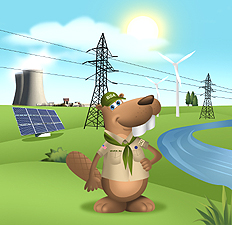Energy


Resources
Energy Requirements
Current Scouts BSA requirements
as of February 19, 2026
as of February 19, 2026
1.
Do the following:
a.
With your parent or guardian's permission, use the internet to find a
blog, podcast, website, or an article on the use or conservation of
energy. Discuss with your counselor what details in the article were
interesting to you, the questions it raises, and what ideas it
addresses that you do not understand.
b.
After you have completed requirements 2 through 8, revisit your source
for requirement 1(a). Explain to your counselor what you have learned
in completing the requirements that helps you better understand the
article.
2.
Show you understand energy forms and conversions by doing the following:
a.
Explain how THREE of the following devices use energy, and explain
their energy conversions: toaster, greenhouse, lightbulb, bow drill,
cell phone, nuclear reactor, sauna, or electric vehicles.
b.
Construct a system that makes at least two energy conversions and
explain this to your counselor.
3.
Show you understand energy efficiency by explaining to your counselor a
common example of a situation where energy moves through a system to
produce a useful result. Do the following:
a.
Identify the parts of the system that are affected by the energy
movement.
b.
Name the system's primary source of energy.
c.
Identify the useful outcomes of the system.
d.
Identify the energy losses of the system.
4.
Conduct an energy audit of your home. Keep a 14 day log that records what
you and your family did to reduce energy use. Include the following in your
report and, after the 14-day period, discuss what you have learned with
your counselor.
a.
List the types of energy used in your home such as electricity, wood,
oil, liquid petroleum, and natural gas, and tell how each is delivered
and measured, and the current cost; OR record the transportation fuel
used, miles driven, miles per gallon, and trips using your family car
or another vehicle.
b.
Describe ways you and your family can use energy resources more wisely.
In preparing your discussion, consider the energy required for the
things you do and use on a daily basis (cooking, showering, using
lights, driving, watching TV, using the computer). Explain what is
meant by sustainable energy sources. Explain how you can change your
energy use through reuse and recycling.
5.
In a notebook, identify and describe five examples of energy waste in your
school or community. Suggest in each case possible ways to reduce this
waste. Describe the idea of trade-offs in energy use. In your response, do
the following:
a.
Explain how the changes you suggest would lower costs, reduce
pollution, or otherwise improve your community.
b.
Explain what changes to routines, habits, or convenience are necessary
to reduce energy waste. Tell why people might resist the changes you
suggest.
6.
Prepare pie charts showing the following information, and explain to your
counselor the important ideas each chart reveals. Tell where you got your
information. Explain how cost affects the use of a nonrenewable energy
resource and makes alternatives practical.
a.
The energy resources that supply the United States with most of its
energy
b.
The share of energy resources used by the United States that comes from
other countries
c.
The proportion of energy resources used by homes, businesses, industry,
and transportation
d.
The fuels used to generate America's electricity
e.
The world's known and estimated primary energy resource reserves
7.
Tell what is being done to make FIVE of the following energy systems
produce more usable energy. In your explanation, describe the technology,
cost, environmental impacts, and safety concerns.
a.
Biomass digesters or waste-to-energy plants
b.
Cogeneration plants
c.
Fossil fuel power plants
d.
Fuel cells
e.
Geothermal power plants
f.
Nuclear power plants
g.
Solar power systems
h.
Tidal energy, wave energy, or ocean thermal energy conversion devices
i.
Wind turbines
8.
Identify three career opportunities that would use skills and knowledge in
energy. Pick one and research the training, education, certification
requirements, experience, and expenses associated with entering the field.
Research the prospects for employment, starting salary, advancement
opportunities, and career goals associated with this career. Discuss what
you learned with your counselor and whether you might be interested in this
career.